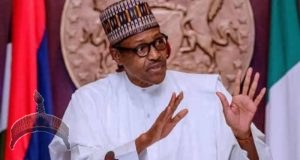Senators and members of the House of Representatives that will constitute the 8th National Assembly and ministers to be appointed by President-elect, Gen. Muhammadu Buhari (retd.), will on assumption of office receive welcome perks amounting to ₦9 billion.
The perks of office include the housing allowance which each of the incoming office holder is entitled to receive once a year, the furniture allowance which they are entitled to once in four years and motor vehicle loan which they are entitled to once in their tenure.
The perks are some of the non-regular allowances that the political office holders are entitled to as prescribed by the Revenue Mobilisation, Allocation and Fiscal Commission (RMAFC).
There are other allowances, both regular and irregular ones, but housing, furniture and motor vehicle are paid at the beginning of the tenure of the office holders to ensure that they settle down appropriately.
Housing allowance for the political office holders is 200% of their annual salaries; furniture is 300% and motor vehicle loan is 400%.
The eighth National Assembly will be inaugurated by Buhari on June 5 after the expiration of the tenure and dissolution of the 7th National Assembly on the same date.
Membership of the eighth National Assembly include 109 senators and 360 members of the House of Representatives elected on the platform of different political parties from across the country.
Investigation showed that each senator would be paid ₦4,052,800 on the assumption of office as housing allowance. They will also be paid the same amount every year because the housing allowance is on annual basis.
This means that 107 senators will be paid a total of ₦433,649,600 as housing allowance annually.
The Senate President and the Deputy Senate President are not entitled to this allowance because their own accommodation is to be provided by the Federal Government.
Similarly, each member of the House of Representatives will be paid ₦3,970,425 as housing allowance on assumption of office.
This means that the 358 representatives will be collecting a total of ₦1,421,412,150 as housing allowance.
Again, the Speaker and Deputy Speaker of the House of Representatives are excluded from this allowance as the Federal Government is to provide their own accommodation.
Following the monetisation of entitlements of public officials, the lawmakers lost the right to occupy houses built and maintained by the government. Consequently, the Federal Government sold the houses previously occupied by the lawmakers to them.
The principal officers of the National Assembly also benefited from the sale of the houses. As a result, the Federal Capital Territory Administration is at present building new houses for the lawmakers that will emerge as the Senate President, the Deputy Senate President, the Speaker and the Deputy Speaker.
For furniture, each of the senators is to get ₦6,079,200. The furniture for both the Senate President and his deputy are to be fully provided by the government. This means that 107 senators will get a total of ₦650,474,400 as furniture allowance. Furniture allowance is paid once in four years.
Each member of the House of Representatives will be paid ₦5,955,637.50 as furniture allowance. This means that 358 representatives will collect a total of ₦2,132,118,225 for furniture.
For vehicle, each of the senators is entitled to ₦8,105,600 while each representative is entitled to ₦7,940,850.50. This means that 107 senators will collect ₦867,299,200 for vehicle while 358 representatives will collect ₦2,842,824,479 for the same purpose.
The allowance for vehicle had been controversial. According to RMAFC, this allowance payable once in four years is a loan for any member that wants. This means that it is repayable.
In 2007, each senator had been given the loan to purchase vehicles. Few months after they had received the loan, the current Senate President, David Mark, demanded that the money totalling about ₦856m should be converted to grants for official cars.
Mark made the request in a letter addressed to the Chairman of the Revenue Mobilisation and Fiscal Allocation Commission.
In the letter dated November 15, 2007 and titled “Monetisation policy as it affects senators of the Federal Republic of Nigeria”, Mark said the senators were not properly briefed that the money was given to them as loan.
He said if senators had known that the money was loan, they would have had the opportunity to exercise the choice of refusal.
He therefore requested that the money should be converted to official car allowance although according to the monetisation policy of the Federal Government, only the President of the Senate and his Deputy are entitled to official cars. The funding for cars for other lawmakers had been built into their salaries which are paid on monthly basis.
RMAFC insisted that the money was a loan and could not be converted to a grant as the lawmakers’ benefits had been monetised. It is not clear how the matter ended as both parties refused to respond to media requests on the issue.
On the executive side, each minister that will serve in the cabinet of Buhari is entitled to a housing allowance of ₦3,915,160.
There are indications that the President-elect will shrink his cabinet by doing away with the ministers of state. However, there is a limit to how far he can reduce the cabinet positions. Constitutionally, each state of the federation must be represented in the cabinet.
This leaves him with at least 36 ministers as against the 42 ministers in President Goodluck Jonathan’s administration. Cumulatively, the ministers are to receive ₦140,945,760 as housing allowance.
Each minister is also entitled to a furniture allowance of ₦6,079,200. Cumulatively, this comes to ₦218,851,200. Each of them is also entitled to a vehicle loan of ₦7,830,320. This comes to a total of ₦281,891,520.
When put together, the housing, furniture and vehicle allowances payable to the lawmakers and ministers will amount to about ₦8.9bn.
Apart from these irregular allowances, there are other regular perks of office that are paid to lawmakers on a monthly basis. These include motor vehicle maintenance and fuelling. This is pegged at 75 per cent of their monthly salary.
Others are personal assistant, 25 per cent; domestic staff, 75 per cent; entertainment, 30 per cent; utilities, 30 per cent; newspapers/periodicals, 15 per cent; wardrobe, 25 per cent; house maintenance, 5 per cent; and constituency, 250 per cent.
There are other entitlements that they do not receive direct payments for but are provided and paid for by the government. These are special assistants, security and legislative aides. What this means is that those engaged in these capacities are paid directly by the government as the allowances cannot be claimed by political office holders. These allowances apply to senators and members of the House of Representatives.
Medical expenses are also borne by the government when they have need for them.
The lawmakers are also entitled to tour duty allowance, estacode (when they travel) and recess allowances. For a senator, the tour duty allowance is ₦37,000 per night; the estacode is $950 per night and the recess allowance is 10 per cent of their annual salary.
For a member of the House of Representatives, the tour duty allowance is ₦35,000 per night; the estacode is $900 per night and the recess allowance is 10 per cent of their annual salary.
The allowances for ministers vary slightly from those of the lawmakers. The allowances of the ministers include motor vehicle fuelling and maintenance – 75 per cent of their salaries. Others are personal assistant, 25 per cent; domestic staff, 75 per cent; entertainment, 45 per cent; utilities, 30 per cent; monitoring, 20 per cent and newspapers/periodicals, 15 per cent.
Their security personnel, medicals and special assistants are also provided. The tour duty allowance is ₦35,000 per night; the estacode is $900 per night and the leave allowance is 10 per cent of their annual salary.
Special Advisers and Special Assistants to the President to be appointed by the president are also entitled to housing and furniture allowances, special allowances and motor vehicle loan but it is not certain how many of these advisers Buhari is going to appoint.
The housing allowance of a special adviser is ₦3,885,750; furniture ₦5,828,625; motor vehicle loan ₦7, 771,500.
The regular allowances of a special adviser include motor vehicle fuelling and maintenance 75 per cent of their salaries; personal assistant 25 per cent; domestic staff 75 per cent; entertainment 45 per cent; utilities 30 per cent; and newspapers/periodicals 15 per cent.
Again, their security personnel, medicals and special assistants are also provided for. The tour duty allowance is ₦25,000 per night; the estacode is $800 per night and the leave allowance is 10 per cent of their annual salary.
Severance allowance is paid to each of the office holders at the end of their tenure in government.
Our correspondents had reported that President Goodluck Jonathan, Vice-President Namadi Sambo, non-returning federal lawmakers, ministers and aides to the President will collect ₦3.24bn as severance allowance.
Although political office holders in the country are among the highest paid government officials in the world, our correspondents also reported that the worry of many Nigerians is not what they earn officially but what accrues to them through self-appropriation and corruption.
 Ọmọ Oòduà Naija Gist | News From Nigeria | Entertainment gist Nigeria|Networking|News.. Visit for Nigeria breaking news , Nigerian Movies , Naija music , Jobs In Nigeria , Naija News , Nollywood, Gist and more
Ọmọ Oòduà Naija Gist | News From Nigeria | Entertainment gist Nigeria|Networking|News.. Visit for Nigeria breaking news , Nigerian Movies , Naija music , Jobs In Nigeria , Naija News , Nollywood, Gist and more









